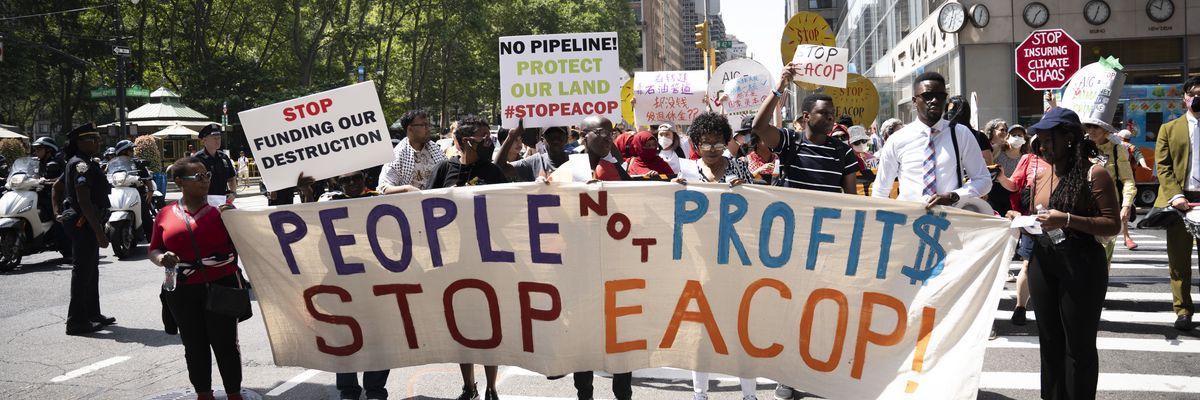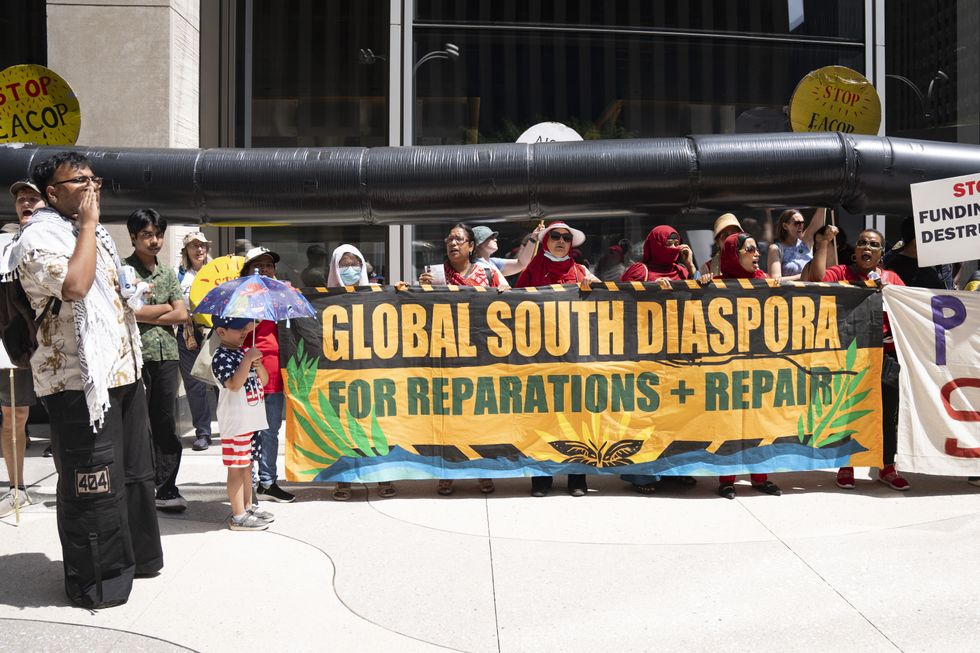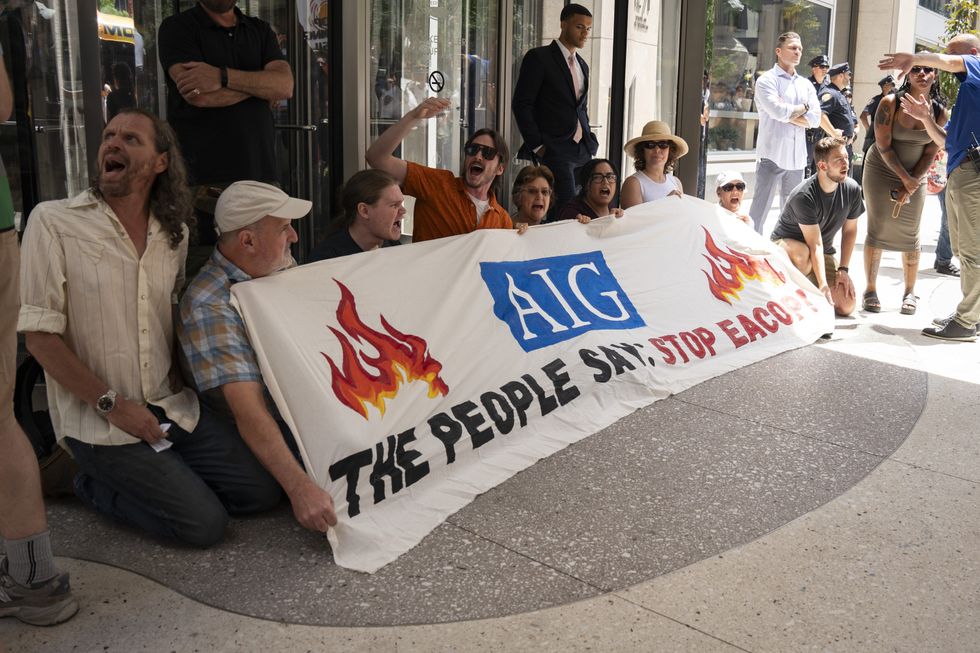

SUBSCRIBE TO OUR FREE NEWSLETTER
Daily news & progressive opinion—funded by the people, not the corporations—delivered straight to your inbox.
5
#000000
#FFFFFF
To donate by check, phone, or other method, see our More Ways to Give page.


Daily news & progressive opinion—funded by the people, not the corporations—delivered straight to your inbox.

Opponents of the East African Crude Oil Pipeline protested AIG's refusal to rule out covering the project in New York City on July 26, 2024.
"We will continue to stand in solidarity and fight together with our African comrades to stop EACOP, to stop the plunder of our homelands, to stop the displacement of our peoples, and to stop imperialist climate destruction."
The "Summer of Heat" continues—both in terms of record-breaking temperatures driven by fossil fuels and a series of nonviolent direct actions targeting Wall Street for its contributions to the climate emergency.
After protests last month calling out Citibank for "financing the arsonists," climate campaigners on Friday set their sights on finance and insurance giant AIG for "stubbornly" refusing to join over two dozen other insurers that won't cover the East African Crude Oil Pipeline (EACOP).
EACOP is set to run nearly 900 miles from Uganda's Lake Albert oilfields to the port of Tanga in Tanzania. Rights groups have sounded the alarm about how the project has devastated the lives and livelihoods of people in its path as well as violence endured by African activists, who have been "kidnapped, arbitrarily arrested, detained, or subjected to different forms of harassment."
Ugandan climate activist Hillary Taylor Seguya declared Friday that "EACOP is a carbon bomb being built in my backyard."
"Thousands of communities in Uganda are being displaced because of corporate greed," added the campaigner, who is affiliated with StopEACOP. "Today, as Ugandans, as Tanzanians, as Africans, we want to be loud and clear that we shall not allow any pipeline to put oil in our backyards."
Friday's demonstration targeting AIG's office in New York City was organized by activists from the Ugandan diaspora and groups including 350.org, the Black Hive, and Desis Rising Up and Moving (DRUM).
"I am here to ask AIG to refuse to insure EACOP, and to insure our future instead," said Joseph Senyonjo, a Ugandan diaspora activist. "AIG is one of the biggest insurance companies in the world, and they still haven't ruled out insuring EACOP. So we are here to say: We don't want carbon bombs, we don't want fossil fuels. We want renewable energy. Insure our futures instead."
Protesters held signs and banners with messaging that included: "AIG = Climate Crimes," "Protect Our Land," "People Not Profits," "Stop Funding Our Destruction," "Stop Insuring Climate Chaos," and "The People Say: Stop EACOP!"

"From the pipeline's path in East Africa, to the corporate offices here, to our government institutions, we need to make our message clear: Stop EACOP!" said Evan Bell of 350 Mass. "I am willing to do what it takes to make sure AIG does not insure EACOP."
Bell noted that he is afraid of the New York Police Department, "especially after their brutal response to campus protesters peacefully demonstrating for an end to genocide in Gaza."
"But I am more afraid of runaway climate change," he added. "I'm more concerned about the current human rights abuses in Uganda and Tanzania. But we are more determined than we are scared."
Molly Ornati of 350 Brooklyn emphasized that "the EACOP pipeline is a doubly destructive disaster—for the people of Uganda and Tanzania, and the planet. The construction of the 900-mile pipeline will disrupt and destroy the homes, land, and livelihood of 100,000 people along the route, as well as the surrounding water and ecosystems."
"Once built, it will be a carbon bomb for humanity," Ornati warned. "In the climate crisis there are no borders, and we are a global movement, united in support of frontline communities, fighting to stop the greed of fossil fuel finance."
DRUM's Mohiba Ahmed delivered a similar message of unity, saying that "we add our communities' voices to the growing international demand 'Stop EACOP!' because we know that our struggles are one and interconnected."
"Our peoples in Bangladesh, Pakistan, Nepal, Guyana, and Trinidad are similarly harmed by foreign domination, imperialism, and capitalist projects that reduce our lives to investments, profit margins, and coins," she stressed.
"Our people and homelands contribute the least to the human-caused climate crisis but disproportionately suffer the most," she added, "and that is why we will continue to stand in solidarity and fight together with our African comrades to stop EACOP, to stop the plunder of our homelands, to stop the displacement of our peoples, and to stop imperialist climate destruction."

Beth Yirga of the Black Hive—part of the Movement for Black Lives—highlighted the frontline resistance to the pipeline, declaring that "we stand with Ugandans and Tanzanians, whose bravery and stories of resistance to stop EACOP are inspiring."
"The climate crisis we are facing exacerbates the oppressive systems designed to extract the most from our planet and global majority community, and unites us that are most impacted," she said. "From Cancer Alley on the riverbanks of the Mississippi River to the lead in Flint, Michigan's water, to the attempts of crude oil extraction in Western Uganda, to the ongoing cobalt mining crisis in Congo, the destructive practices of environmental racism on Black communities is collectively held and felt across the world."
"As we fight to stop climate injustices globally," Yirga added, "we also collaborate to imagine and build a world free of the capitalistic pillaging of Mother Earth."
Dear Common Dreams reader, The U.S. is on a fast track to authoritarianism like nothing I've ever seen. Meanwhile, corporate news outlets are utterly capitulating to Trump, twisting their coverage to avoid drawing his ire while lining up to stuff cash in his pockets. That's why I believe that Common Dreams is doing the best and most consequential reporting that we've ever done. Our small but mighty team is a progressive reporting powerhouse, covering the news every day that the corporate media never will. Our mission has always been simple: To inform. To inspire. And to ignite change for the common good. Now here's the key piece that I want all our readers to understand: None of this would be possible without your financial support. That's not just some fundraising cliche. It's the absolute and literal truth. We don't accept corporate advertising and never will. We don't have a paywall because we don't think people should be blocked from critical news based on their ability to pay. Everything we do is funded by the donations of readers like you. Will you donate now to help power the nonprofit, independent reporting of Common Dreams? Thank you for being a vital member of our community. Together, we can keep independent journalism alive when it’s needed most. - Craig Brown, Co-founder |
The "Summer of Heat" continues—both in terms of record-breaking temperatures driven by fossil fuels and a series of nonviolent direct actions targeting Wall Street for its contributions to the climate emergency.
After protests last month calling out Citibank for "financing the arsonists," climate campaigners on Friday set their sights on finance and insurance giant AIG for "stubbornly" refusing to join over two dozen other insurers that won't cover the East African Crude Oil Pipeline (EACOP).
EACOP is set to run nearly 900 miles from Uganda's Lake Albert oilfields to the port of Tanga in Tanzania. Rights groups have sounded the alarm about how the project has devastated the lives and livelihoods of people in its path as well as violence endured by African activists, who have been "kidnapped, arbitrarily arrested, detained, or subjected to different forms of harassment."
Ugandan climate activist Hillary Taylor Seguya declared Friday that "EACOP is a carbon bomb being built in my backyard."
"Thousands of communities in Uganda are being displaced because of corporate greed," added the campaigner, who is affiliated with StopEACOP. "Today, as Ugandans, as Tanzanians, as Africans, we want to be loud and clear that we shall not allow any pipeline to put oil in our backyards."
Friday's demonstration targeting AIG's office in New York City was organized by activists from the Ugandan diaspora and groups including 350.org, the Black Hive, and Desis Rising Up and Moving (DRUM).
"I am here to ask AIG to refuse to insure EACOP, and to insure our future instead," said Joseph Senyonjo, a Ugandan diaspora activist. "AIG is one of the biggest insurance companies in the world, and they still haven't ruled out insuring EACOP. So we are here to say: We don't want carbon bombs, we don't want fossil fuels. We want renewable energy. Insure our futures instead."
Protesters held signs and banners with messaging that included: "AIG = Climate Crimes," "Protect Our Land," "People Not Profits," "Stop Funding Our Destruction," "Stop Insuring Climate Chaos," and "The People Say: Stop EACOP!"

"From the pipeline's path in East Africa, to the corporate offices here, to our government institutions, we need to make our message clear: Stop EACOP!" said Evan Bell of 350 Mass. "I am willing to do what it takes to make sure AIG does not insure EACOP."
Bell noted that he is afraid of the New York Police Department, "especially after their brutal response to campus protesters peacefully demonstrating for an end to genocide in Gaza."
"But I am more afraid of runaway climate change," he added. "I'm more concerned about the current human rights abuses in Uganda and Tanzania. But we are more determined than we are scared."
Molly Ornati of 350 Brooklyn emphasized that "the EACOP pipeline is a doubly destructive disaster—for the people of Uganda and Tanzania, and the planet. The construction of the 900-mile pipeline will disrupt and destroy the homes, land, and livelihood of 100,000 people along the route, as well as the surrounding water and ecosystems."
"Once built, it will be a carbon bomb for humanity," Ornati warned. "In the climate crisis there are no borders, and we are a global movement, united in support of frontline communities, fighting to stop the greed of fossil fuel finance."
DRUM's Mohiba Ahmed delivered a similar message of unity, saying that "we add our communities' voices to the growing international demand 'Stop EACOP!' because we know that our struggles are one and interconnected."
"Our peoples in Bangladesh, Pakistan, Nepal, Guyana, and Trinidad are similarly harmed by foreign domination, imperialism, and capitalist projects that reduce our lives to investments, profit margins, and coins," she stressed.
"Our people and homelands contribute the least to the human-caused climate crisis but disproportionately suffer the most," she added, "and that is why we will continue to stand in solidarity and fight together with our African comrades to stop EACOP, to stop the plunder of our homelands, to stop the displacement of our peoples, and to stop imperialist climate destruction."

Beth Yirga of the Black Hive—part of the Movement for Black Lives—highlighted the frontline resistance to the pipeline, declaring that "we stand with Ugandans and Tanzanians, whose bravery and stories of resistance to stop EACOP are inspiring."
"The climate crisis we are facing exacerbates the oppressive systems designed to extract the most from our planet and global majority community, and unites us that are most impacted," she said. "From Cancer Alley on the riverbanks of the Mississippi River to the lead in Flint, Michigan's water, to the attempts of crude oil extraction in Western Uganda, to the ongoing cobalt mining crisis in Congo, the destructive practices of environmental racism on Black communities is collectively held and felt across the world."
"As we fight to stop climate injustices globally," Yirga added, "we also collaborate to imagine and build a world free of the capitalistic pillaging of Mother Earth."
The "Summer of Heat" continues—both in terms of record-breaking temperatures driven by fossil fuels and a series of nonviolent direct actions targeting Wall Street for its contributions to the climate emergency.
After protests last month calling out Citibank for "financing the arsonists," climate campaigners on Friday set their sights on finance and insurance giant AIG for "stubbornly" refusing to join over two dozen other insurers that won't cover the East African Crude Oil Pipeline (EACOP).
EACOP is set to run nearly 900 miles from Uganda's Lake Albert oilfields to the port of Tanga in Tanzania. Rights groups have sounded the alarm about how the project has devastated the lives and livelihoods of people in its path as well as violence endured by African activists, who have been "kidnapped, arbitrarily arrested, detained, or subjected to different forms of harassment."
Ugandan climate activist Hillary Taylor Seguya declared Friday that "EACOP is a carbon bomb being built in my backyard."
"Thousands of communities in Uganda are being displaced because of corporate greed," added the campaigner, who is affiliated with StopEACOP. "Today, as Ugandans, as Tanzanians, as Africans, we want to be loud and clear that we shall not allow any pipeline to put oil in our backyards."
Friday's demonstration targeting AIG's office in New York City was organized by activists from the Ugandan diaspora and groups including 350.org, the Black Hive, and Desis Rising Up and Moving (DRUM).
"I am here to ask AIG to refuse to insure EACOP, and to insure our future instead," said Joseph Senyonjo, a Ugandan diaspora activist. "AIG is one of the biggest insurance companies in the world, and they still haven't ruled out insuring EACOP. So we are here to say: We don't want carbon bombs, we don't want fossil fuels. We want renewable energy. Insure our futures instead."
Protesters held signs and banners with messaging that included: "AIG = Climate Crimes," "Protect Our Land," "People Not Profits," "Stop Funding Our Destruction," "Stop Insuring Climate Chaos," and "The People Say: Stop EACOP!"

"From the pipeline's path in East Africa, to the corporate offices here, to our government institutions, we need to make our message clear: Stop EACOP!" said Evan Bell of 350 Mass. "I am willing to do what it takes to make sure AIG does not insure EACOP."
Bell noted that he is afraid of the New York Police Department, "especially after their brutal response to campus protesters peacefully demonstrating for an end to genocide in Gaza."
"But I am more afraid of runaway climate change," he added. "I'm more concerned about the current human rights abuses in Uganda and Tanzania. But we are more determined than we are scared."
Molly Ornati of 350 Brooklyn emphasized that "the EACOP pipeline is a doubly destructive disaster—for the people of Uganda and Tanzania, and the planet. The construction of the 900-mile pipeline will disrupt and destroy the homes, land, and livelihood of 100,000 people along the route, as well as the surrounding water and ecosystems."
"Once built, it will be a carbon bomb for humanity," Ornati warned. "In the climate crisis there are no borders, and we are a global movement, united in support of frontline communities, fighting to stop the greed of fossil fuel finance."
DRUM's Mohiba Ahmed delivered a similar message of unity, saying that "we add our communities' voices to the growing international demand 'Stop EACOP!' because we know that our struggles are one and interconnected."
"Our peoples in Bangladesh, Pakistan, Nepal, Guyana, and Trinidad are similarly harmed by foreign domination, imperialism, and capitalist projects that reduce our lives to investments, profit margins, and coins," she stressed.
"Our people and homelands contribute the least to the human-caused climate crisis but disproportionately suffer the most," she added, "and that is why we will continue to stand in solidarity and fight together with our African comrades to stop EACOP, to stop the plunder of our homelands, to stop the displacement of our peoples, and to stop imperialist climate destruction."

Beth Yirga of the Black Hive—part of the Movement for Black Lives—highlighted the frontline resistance to the pipeline, declaring that "we stand with Ugandans and Tanzanians, whose bravery and stories of resistance to stop EACOP are inspiring."
"The climate crisis we are facing exacerbates the oppressive systems designed to extract the most from our planet and global majority community, and unites us that are most impacted," she said. "From Cancer Alley on the riverbanks of the Mississippi River to the lead in Flint, Michigan's water, to the attempts of crude oil extraction in Western Uganda, to the ongoing cobalt mining crisis in Congo, the destructive practices of environmental racism on Black communities is collectively held and felt across the world."
"As we fight to stop climate injustices globally," Yirga added, "we also collaborate to imagine and build a world free of the capitalistic pillaging of Mother Earth."